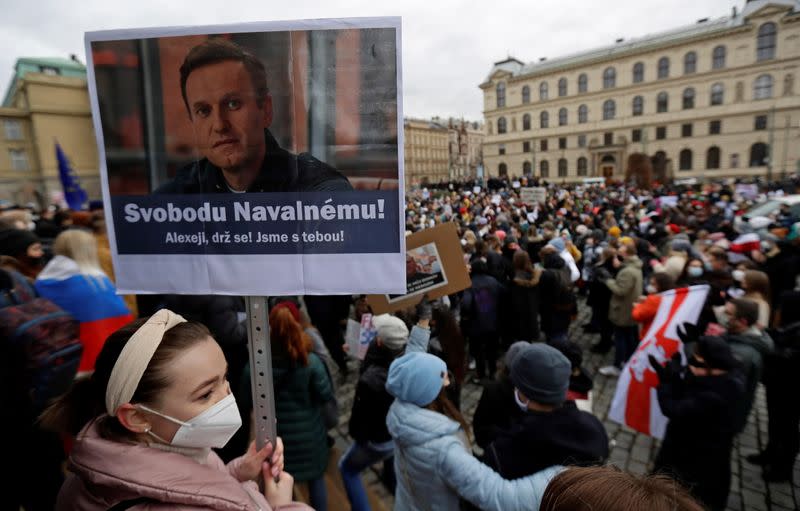Jailed Kremlin foe Navalny being used by West to destabilise Russia: Putin ally
- Oops!Something went wrong.Please try again later.
- Oops!Something went wrong.Please try again later.
MOSCOW (Reuters) - Jailed Kremlin critic Alexei Navalny is being used by the West to try to destabilise Russia, a prominent hardliner and ally of President Vladimir Putin said on Tuesday, saying he must be held to account for repeatedly breaking the law.
Navalny was remanded in custody for 30 days last week after returning from Germany where he had been recovering from a nerve agent poisoning. He could face years in jail for parole violations and other legal cases he calls trumped up.
Nikolai Patrushev, secretary of the Security Council, called for Navalny to face the full force of the law in comments that offered a glimpse into the mood inside Russia's security establishment after tens of thousands of Navalny's supporters protested against his jailing on Saturday.
"He (Navalny), this figure, has repeatedly (and) grossly broken Russian legislation, engaging in fraud concerning large amounts (of money). And as a citizen of Russia he must bear responsibility for his illegal activity in line with the law," Patrushev told the Argumenty i Fakty media outlet.
"The West needs this figure to destabilise the situation in Russia, for social upheaval, strikes and new Maidans," Patrushev said, in a reference to the 2014 revolution in Ukraine that ousted a Moscow-backed president.
When asked about Patrushev's comments, Kremlin spokesman Dmitry Peskov said it was up to a court to make further decisions in the opposition politician's case and that it was not a matter for the Kremlin.
Navalny faces a court hearing on Feb.2.
Police detained more than 3,700 people on Saturday as protesters called on the Kremlin to release Navalny. The Kremlin said the protests were illegal.
Peskov on Tuesday said there could be no dialogue with illegal protesters, accusing them of behaving aggressively and of using what he called unprecedented violence against the police.
He said incidences of police violence against protesters, some of which were captured on video, were far fewer and being investigated.
In a sign that Russian authorities may crack down hard after the protests, the Kommersant newspaper on Tuesday cited unnamed security sources as saying they may open a criminal investigation that would treat the demonstrations as "mass unrest".
The West has called for Navalny's release, but the European Union has said it will refrain from fresh sanctions on Russian individuals if Moscow releases Navalny after 30 days.
(Reporting by Tom Balmforth; editing by Andrew Osborn)


